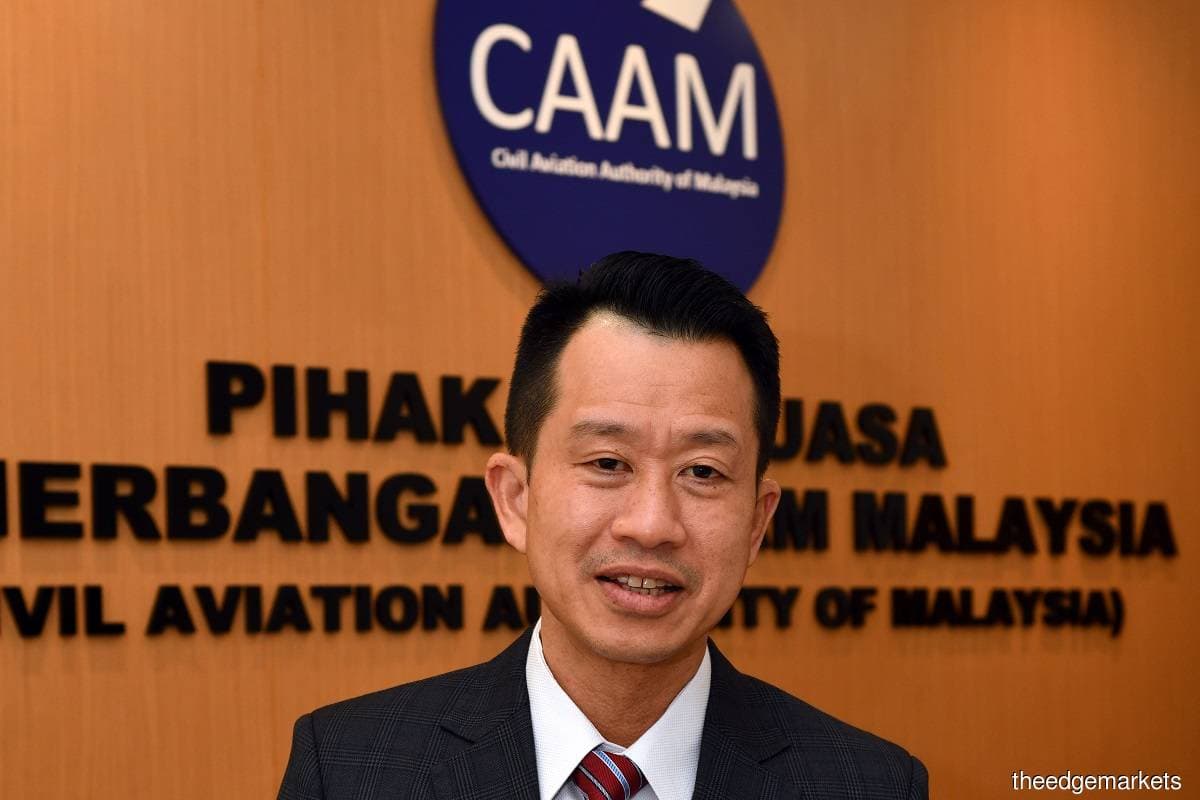
KUALA LUMPUR (Dec 23): Plans are still on track to have the Civil Aviation Authority of Malaysia (CAAM) improve the remuneration package of its employees and become financially independent, says Datuk Captain Chester Voo Chee Soon, the outgoing chief executive officer (CEO) of the aviation safety regulator.
A lack of trained personnel was one of 33 issues raised by the US Federal Aviation Administration (FAA) that had led to Malaysia’s air safety oversight being downgraded to Category 2 from Category 1 in November 2019, impacting the ability of local airlines to launch and add flights to the US.
Recognising that the authority’s remuneration package was not attractive enough to retain and recruit talent, the government had instructed CAAM, a statutory body under the purview of the Ministry of Transport, to undertake a revision of its fees and charges to be self-sufficient.
“(The plan for a better pay structure) is in place. We had commissioned two consultant reports. One is to implement a new human resource organisational structure for CAAM to be financially independent, including a salary adjustment that will strike a balance between civil service pay and that of the private sector's. This has been approved by the authority’s board,” Voo told The Edge in an interview.
CAAM employs about 1,400 people, including technical personnel, officers and administrative staff.
The second report is a comprehensive review of the authority’s fees and charges, which will be submitted to the board for approval next month. “The board will then present the report to the transport minister. If approved, CAAM will be on the path to financial independence. About nine main fees and charges will be revised. Still, it is not so much about increasing the fees and charges, but so that what we collect will be in line with our efficiency,” he said.
“Our current fee structure is too low to begin with. The fees and charges were last reviewed in 2016 when they were raised slightly. However, the revision didn’t take into account what is the overall cost for CAAM to run as an independent entity. But with the revision, it will be enough,” he added.
“I am confident the current management of CAAM will carry this plan through,” he added.
The planned merger of the Malaysian Aviation Commission with CAAM remains in the works, said Voo. “As far as I know, there is no change. The merger is a Cabinet decision. We are still at the point of legislation.”
The merger involves the repeal of Mavcom’s founding act, Mavcom Act 2015 (Act 771), and amendments to CAAM’s founding act, CAAM Act 2017 (Act 788).
Voo will step down on Dec 31, 2022, after two and a half years at CAAM's helm. His resignation was a surprise as he had just extended his contract by another three years to May 31, 2025.
Voo said CAAM’s authority members are now working with the transport minister to identify his potential successor.
Asked if an internal candidate may take the helm, Voo said: “I hope so. There are capable and suitable officers within. Most of the management team and directors have been part of this transformation journey with me in the past two and a half years.” He has two deputies, Zainul Abidin Maslan for operations, and Captain Norazman Mahmud of regulators.
What’s next for Voo?
The 47-year-old Voo joined CAAM in June 2020, when the authority was grappling with its Category 2 downgrade, and staffing levels, morale and productivity were at all-time lows.
The rating was finally revised to Category 1 status on Oct 1 — three years after the downgrade.
“My goals were for CAAM to regain Category 1 status and to implement changes that are sustainable. It was also about fixing the root causes,” he said.
He spent the last two and a half years working on three things.
“Firstly, I focused on getting our documents, processes, implementation and evidence methods right. Secondly, I focused on shifting employee mindsets towards serving our clients better. That’s why we introduced a client charter.
“Thirdly, I focused on efficiency through digitalisation. How do we use maximum automation to benefit us by reducing our workload? It is a mindset shift and it takes time,” he said. “My job is now done. CAAM is now strong. The structure and pillars are all up. With everything in place, a new leadership would be good for CAAM,” he added.
Voo declined to say where he is heading next, except that he will wait till after Dec 31 before making the decision on his next job, adding that there are several job offers on the table, all of which are aviation related.
Prior to joining CAAM, Voo served at AirAsia Bhd for 12 years, holding various management roles, including as a ground instructor, crew resource instructor, chief of pilot operations, and director of flight operations. He started his commercial flying career with Malaysia Airlines in 1993 as a cadet pilot.
“I want to do something else (besides CAAM). I would like to do work that has a lot of opportunities to touch people, to motivate and build them. It might or might not be in the aviation industry, but I want to create a lot of value.
“I am a strong believer of giving opportunities to younger people to move up fast in leadership with the right guidance. We often hear of people with lots of ideas. I want to focus on being able to implement them. I want a chance to build something and be part of it,” he said.
While he keeps mum about where he will be next, he is raring to get there. “I would like to start work on Jan 3.”